- Home
- Clifton Adams
Boomer
Boomer Read online
Boomer
Clifton Adams
A SIX-GUN SHOWDOWN EXPLODED OVER THE WEST'S RICHEST OIL FIELD.
Boomer
Clay Randall
Ben Farley's Word Was Law!
No man challenged his gun or his oil-field roustabouts. Those who tried it saw their rigs burned, their supplies stolen, their men beaten.
Joe Grant knew this. But when his boss was killed and young Bud Muller was clubbed senseless, he had to fight back.
Farley's roustabouts rushed him, smashed his head with a gun butt, crashed their steel-capped boots against his ribs. Barely conscious, Grant rolled and went for his gun.
Farley smiled down at the prostrate man. Then he leveled the muzzle of his .38 at Grant's head.
CHAPTER ONE
A LIGHT SNOW had fallen the night before and Missouri had lain for a little while under a veil of white. Now the roads were glistening ribbons of black mud, churned up by farm wagons making their weekly pilgrimage to Joplin.
It was Saturday, and the streets of Joplin were crowded with farmers' teams and wagons, as they were every Saturday; the sidewalk was a mass of pink-cheeked, frost-breathing humanity. The invigorating tang of winter was in the air.
One man stood alone, apart from the crowd, oblivious to the activity that surrounded him. A fair, square-built man in his early thirties, he hunched into his sheep-lined wind-breaker, staring hard at the blank stone face of the bank building on the other side of the street. At last he reached into his windbreaker, took out a silver railroad watch and glanced with bleak satisfaction at the dial. “Almost four o'clock,” he told himself. “Well, there's no use putting it off.”
He waded through the ankle-deep mud of the street, stepped up to the sidewalk, and pushed his way toward the stolid stone building.
A breath of heated air struck him as he stepped inside the bank and closed the door. He raked the place with sober eyes, noting that most of the customers had become aware of the time and were leaving before the bank closed its doors.
The fair-haired man stepped up to a teller's cage and said, “I want to talk to Abel Ortway.”
“I'm afraid Mr. Ortway is...
“Tell him it's important.”
There was something about the voice that made the teller frown. “Well, I'll see...”
But at that moment a stout, florid-faced man came up front from the vault. “What is it, Ransom?” Then, looking at the fair-haired man: “Oh, so it's you again.”
“I want to talk to you, Mr. Ortway. Private.”
“You know the banking hours,” Ortway said with some irritation. “We close at four.”
“But this is important. I just got to town.”
The banker's eyes narrowed. “Did you get the money?”
“Let's talk about it in your office.”
Ortway hesitated, looking vaguely worried. Thoughtfully, he drew a cigar from his vest pocket and rolled it unlighted from one side of his mouth to the other. “All right,” he said at last. “But make it quick.”
Ortway's office was bare of ornaments but comfortable in a solid, mannish fashion. He sat at a roll-top desk and nodded for the other man to take a chair. “All right. Now what is it that's so important?”
“I want to ask you for an extension on my loan.”
Abruptly the banker laughed, the sound rolling out free and easy. “Now that's the damnedest thing I've heard all day! Why on earth should I give you an extension?”
The fair-haired man smiled. “No reason, I guess, except that you promised me one. Remember when you came out to my farm last spring and told me the place needed fencing on the south boundary? And a new windmill for the livestock? You told me to go ahead and make the improvements, and if I needed an extension on my loan you'd give it to me.”
“That was last spring.” Ortway smiled with heavy satisfaction. “Conditions change.”
“But there've been hard dry-ups two years running. These things almost never run in threes. Next year I'll make a crop and pay off the loan, plus any fair interest you want to name.”
Ortway shook his head, still smiling. “What kind of businessman would I be to listen to a story like that? I hear the same yarn fifty times a year from you hard-scrabble farmers. You can't make a go of it and you want somebody else to stand good for your failure.”
For some strange reason the fair-haired man never lost his even temper. “I see. You're going to foreclose. You're going to take my farm.”
“Put yourself in my shoes. It's the only sensible thing to do.”
“Maybe...” He sat quietly for a moment, his thoughts turned inward. Then, “I want to tell you about that farm, Mr. Ortway. It's not so much, but it's something I worked five years to get and two years to improve. I trailed cattle, Ortway. Maybe five thousand miles I trailed them back and forth across Indian Territory. I saved my money and told myself that someday I'd stop killing myself working for other people and be my own boss. Seven years of my life, Ortway, that's how much I've got in that farm. I never would have gone into debt for those improvements if you hadn't promised to help.”
“As time goes on,” Ortway said easily, “you'll learn that promises don't mean a thing unless they're on paper.”
The man sat lost in contemplation. “I didn't want to do this,” he said finally, “but I guess there's no other way.” Slowly, almost wearily, he reached into his windbreaker and drew out a well-used .45 revolver.
Ortway made a startled sound and then stared mutely into the deadly muzzle. “I've got it all figured out,” the man said quietly. “I paid three thousand for the farm and borrowed another thousand from you to make the improvements. Now, I figure if you take the place over you'll be making two thousand dollars clear on the deal, plus the cost of the windmill and fencing. To say nothing of the two years' work I've put in the land. Twenty-five hundred dollars, that's about what you stand to make on the foreclosure, isn't it, Ortway?”
The banker could not take his eyes from the muzzle of the revolver. He licked his lips nervously. “What... what do you mean to do?”
“I mean to take that twenty-five hundred dollars. That's what your broken promise cost me.”
Behind the fear in his eyes, the working of Ortway's brain was almost a visible thing. “Look,” he said quickly, “I'll keep my promise! I'll give you any kind of extension you want! I'll put it on paper!”
“It's a little late for that, Ortway. I'll take the money.”
“You'll never get away with this!” Ortway almost whined. “I won't be bullied!”
There were two metallic clicks as the fair-haired man thumbed the hammer back on the .45. “Call the teller,” he said coldly. “The one named Ransom. Tell him to bring the money—that you've just made a loan.”
“I won't do it!”
For a moment Ortway locked his jaws in stubbornness, but he began to swallow nervously when he saw the man's hand tightening on the butt of the revolver. Several seconds must have passed. Sweat formed in glistening beads on the banker's forehead as the hand drew tighter and tighter, the trigger starting to give under the pressure. A drop of sweat fell on Ortway's desk and the sound could be heard clearly in the silence of the room.
“All right!” the banker said hoarsely. “Only put that gun away!”
The man smiled slightly, then took off his battered Stetson and covered the revolver. But the muzzle was still leveled at Ortway's chest.
“Ransom!” the banker called. And when the teller appeared in the doorway, Ortway said, “Get twenty-five hundred dollars out of the vault and bring it to me.”
The teller looked surprised, but evidently he was not one to question Ortway's wishes. “Very well, sir. How do you want it?”
The fair-haired man raised his head and said thoughtfully, “Bills, not
too large. That will be all right, won't it, Mr. Ortway?”
The banker swallowed hard, his florid face almost crimson. “Yes, that will be all right.”
The teller was well trained. He brought the money, placed it in front of his employer, and left quietly, closing the door behind him. “You'll never get away with this!” Ortway started. “You'll never...”
The fair-haired man stopped the banker's words quickly and expertly with a sudden blow to Ortway's flabby jaw. Quickly he stuffed one blue bandanna into the lax mouth and secured the gag with another handkerchief. He took a length of pigging cord from his windbreaker and tied the banker hand and foot to his chair. At last he stood back and viewed his work professionally.
Not bad, he thought. He'll be good for an hour at least, if nobody finds him. He unbuttoned his shirt and put the bundle of bills next to his body, then he opened the door, nodding pleasantly to the teller on his way out of the bank. “Mr. Ortway's busy,” he said. “He asked not to be disturbed.”
“Thank you,” the teller said gratefully.
The fair-haired man stepped outside and stood for a moment on the sidewalk, thinking. From this moment on, he thought, I am a different man. Never again can I be the man who just left Ortway's office.
This posed a minor problem, one that he hadn't anticipated. He had to have a name. A new name. One that would connect him in no way to the past—he smiled—or the present. It was almost like being born again, except this time he was allowed to choose for himself any name he wanted.
Grant, he thought, picking the name out of the air. He liked it. Joe Grant. That is my name. He was pleased with this decision. The name was short and comfortable, easy to get used to....
So it was Joe Grant who walked casually to the end of the block, swung lazily atop a shaggy bay mare, and rode with brazen unconcern out of Joplin that day. It was Joe Grant who grinned easily to a few acquaintances and pointed the bay north at a quiet, unhurried gait, until the town lay well behind. Then he nudged his shaggy mount to an easy lope, quartering cross-country along a well-used trail to the northwest.
Everything had gone just the way he had planned it, right down to the last detail. Ortway had refused the loan extension—just the way Joe Grant had figured he would. Grant felt the uncomfortable bulge of twenty-five hundred dollars next to his body and grinned to himself. Ortway was going to raise a holler that could be heard clear to the Cherokee border when he finally got loose from that chair, but Grant had anticipated this, too, and was not worried.
After about thirty minutes Grant reined the bay up beside the road and let the animal blow. Maybe, he thought, Ortway was already hollering. Maybe a posse was already forming.
Calmly, he took a sack of makings from his windbreaker and methodically built a thin, compact cigarette, no trace of concern or worry in his lean face. All roads leading to Joplin were well trampled that day, and tracking would be a slow, tedious job at best. Sooner or later, though, he knew the posse would pick up the trail and head this way, so there was no sense being overly confident.
He rode for another mile along the muddy road, then swung abruptly across open country, leaving tracks in the snow that the greenest sort of dude could follow with perfect ease. He spurred the bay once more to a rocking lope, and his face sobered for a moment as he gazed straight ahead to the north. His thoughts sped far in advance of the grunting pony, across Boggy Creek and through the wild-plum thickets and over a familiar rise that he never expected to see again. And finally, in his mind, he was riding down the other side of the rise to where his farm lay in the shallow draw.
He smiled a bit thinly. “Ortway's farm,” he corrected himself.
But this man who called himself Joe Grant was not one to dwell on unpleasantness. The past, he reasoned, was the past. No use for a man keeping himself stirred up over a thing that couldn't be helped. Maybe he wasn't cut out to be a farmer anyway. Sometimes a cowhand could get some pretty queer ideas about what he wanted out of life.
Joe Grant shook his head, faintly puzzled at his own thoughts. By rights I ought to hate Ortway's guts, he thought. Another man would have squealed like a stuck pig if he'd been robbed the way Ortway tried to rob me. Maybe, he reasoned, it's just as well that I'm not the kind to get too attached to a piece of ground, like some men. If I was...
He let the thought drop. He had drifted from place to place, from job to job, all his life. Oh, he had liked the farm well enough, but it was a lonely life. To be perfectly truthful, he was beginning to get a little tired of being staked out in one place all the time.
Suddenly he grinned, exhilarated by the knowledge that he was no longer tied to anything. Maybe he and Ortway had actually done each other a favor! After all, the banker had got himself a good farm at a good price, and Grant had got back most of the money he'd put into it, not counting the two years of work and worry. What could be fairer than that?
Fair or not, he knew that the banker's reasoning would not run along the same lines as his own, and Grant kneed the bay to a faster gait as he raised Boggy Creek in the distance.
Carefully he put the bay down the sloping bank of the creek, reining up in midstream. Then he jumped out of the saddle, grunting at the shock of icy water. Quickly he stripped his rig from the animal's back. “This is where we part company, boy!” he said, cracking the bay sharply across the rump.
He stood for a moment watching the animal streak up the opposite bank and cut sharply toward the west. This, too, was part of the plan. Only the day before he had traded a strong mule for that stunted bay, hoping that the animal, set free, would head for his old home to the west. It was exactly what the bay was doing.
Grant smiled, then shouldered his rig and headed downstream through the hip-deep water. Soon his legs were numb and without feeling. He stumbled on rocks and stirred up mud, but he knew that the stream would settle by the time the posse reached it. The bite of the cold water almost took his breath away, but he waded on for several minutes, keeping always in the middle of the stream.
At last he spotted the shale outcropping where a sturdy little dun was tethered in a clump of willows. Grant climbed stiffly to the outcropping, rubbing his legs until feeling began to return, then hobbled to the horse and slapped the animal good-naturedly. “Don't look so smug, boy. You'll get a taste of it before long.” He limped to the willows and drew a blanket roll from under a pile of dead leaves.
The dun cocked its head curiously as Grant stripped himself of shoes, trousers, underwear, and rubbed himself dry with a spare shirt from the roll. Puffing and grunting, he climbed into dry clothes, exchanged his soaked work shoes for riding boots. “That's better!” he said aloud, walking in a tight circle, stamping his feet to wedge them into the snug vamps.
There was just one more thing to be done. Joe Grant was a new man with a new name—it logically followed that such a man would need to look different.
First he propped a small metal mirror against a willow trunk, then from the roll he took out a pint jar filled with dark liquid—water in which he had boiled walnut hulls and wild berries. This, too, was part of his plan.
With a small brush he began applying the liquid to his hair and eyebrows. He worked fast but cautiously; he had practiced it carefully. He knew exactly what the result would be. At last he held the mirror at arm's length, inspecting first one side and then the other. The fair-haired man now had glistening dark brown hair with a reddish cast. He knew from experience that the color would become dull and more natural upon drying.
All in all he was satisfied with the result. Perhaps his eyes looked a bit pale beneath the dark eyebrows, but he didn't expect to keep this stuff on his head forever. Just until he was safely out of Missouri. Soon he'd be headed for the Indian country, or Texas, or maybe Mexico, where the color of his hair would make no difference.
Now he repacked the roll and tied it. He threw his rig on the dun and lashed the roll behind the saddle. “Now it's your turn,” he told the horse and he swung up to the saddle an
d reined into the middle of the stream.
Everything was working perfectly. Not even the most expert sign reader could find anything on that hard shale where the dun had been tethered. The posse, when it came, would follow the bay's tracks miles to the west. By the time they figured out what had happened, their man would be well out of Missouri.
CHAPTER TWO
BY SUNDOWN GRANT was well east of Joplin, heading south with the eye of his mind on Arkansas. From Arkansas he'd head into the Cherokee Nation where it should be a simple thing to get himself lost in the crowds and excitement. Oklahoma was preparing for statehood, Indian lands were being cut up for individual allotments, there had been talk of oil strikes near Bartlesville and Dewey. With all those things to keep people worked up, Grant thought, it's not likely they'll pay much attention to another saddle tramp riding through.
Several times he had held up in draws and gullies while farm wagons rattled along the muddy roads. At last he felt that he was comparatively safe and decided to wait till dark to make his run for Arkansas.
In a gully, a few miles north of Monett, he opened a can of beans and ate with fine appetite. He chuckled to himself, enjoying the feel of twenty-five hundred dollars next to his body. It was a lot of money. His money. He had worked hard for it.
Maybe, he dreamed, I'll buy in on a small cow outfit in Texas. Or lease some Indian land and run my own brand. One thing he was sure of, he wasn't going to try farming again. Cows he understood. But bankers and crop failures and droughts were not for him.
He hunched into his windbreaker, chuckling again as he remembered Ortway's expression of outrage. “I'll bet he's still hollering,” he said aloud. “His kind always holler.”
Not until it was full dark did he set his rig and head south, skirting wide to the west in order to miss Monett. It would be an easy ride to Arkansas, even at night....
Perhaps he had been out of the saddle too long. Perhaps his hands and his mind had been too long occupied at plowing and his horseman's instinct had become dulled. Or perhaps it simply was the way that luck would have it when the sturdy little dun stepped into a gopher hole that night and snapped a foreleg.

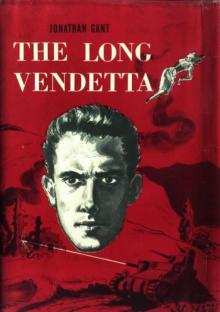 The Long Vendetta
The Long Vendetta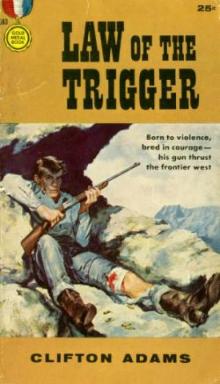 The Law of the Trigger
The Law of the Trigger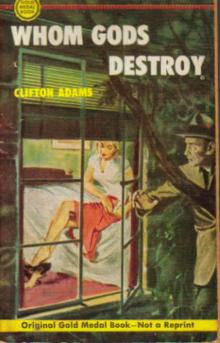 Whom Gods Destroy
Whom Gods Destroy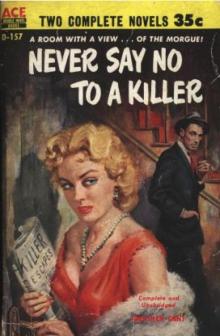 Never Say No To A Killer
Never Say No To A Killer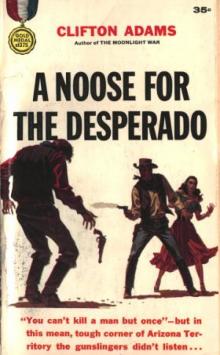 A Noose for the Desperado
A Noose for the Desperado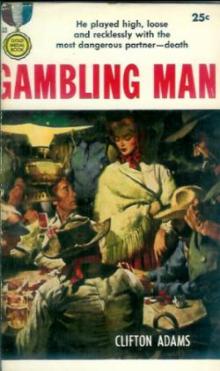 Gambling Man
Gambling Man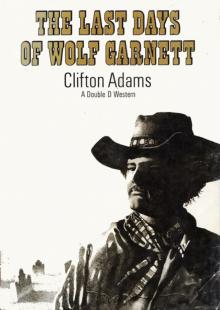 The Last Days of Wolf Garnett
The Last Days of Wolf Garnett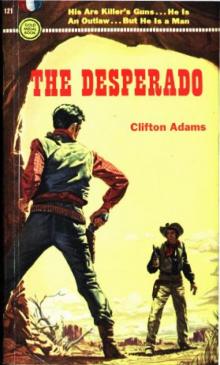 The Desperado
The Desperado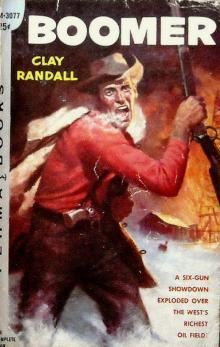 Boomer
Boomer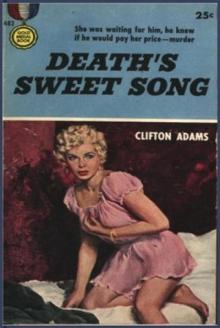 Death's Sweet Song
Death's Sweet Song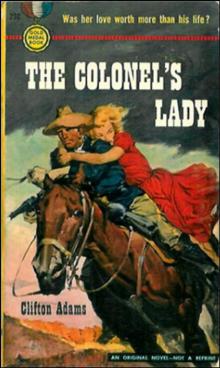 The Colonel's Lady
The Colonel's Lady